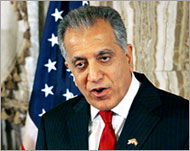UK minister urges Iraq unity
Britain’s foreign secretary has told Iraqi leaders they must form a national unity government free of domination by a single group.

Jack Straw said on Tuesday that the results of the 15 December parliamentary election indicated that the Iraqi people wanted a “broad government of national unity” to bring together “all the different elements” of Iraqi society.
“It is a crucial moment today for the people of Iraq,” Straw told reporters alongside President Jalal Talabani.
“The international community, particularly those of us who played a part in liberating Iraq, obviously have an interest in a prosperous and stable and democratic Iraq.”
Straw said the election results indicated that Iraqis wanted a government where “no party, no ethnic or religious grouping can dominate the government”.
The British official’s comments came as an Iraqi Cabinet minister escaped injury when a bomb exploded near her convoy in eastern Baghdad on Tuesday, police said.
Seven Iraqis were also killed in a series of other attacks.
Straw arrived in Baghdad late on Monday after US Ambassador Zalmay Khalilzad delivered a blunt warning that Iraqi leaders risk losing American support unless they establish a national unity government, with the police and the army out of the hands of religious parties.
Deep divisions
 |
|
Khalilzad said Iraqi leaders |
The British foreign secretary’s visit was a sign of international concern over the direction of the talks among Iraq’s Shia, Sunni Arab and Kurdish political parties, as they attempt to put together a government.
Those talks, which began in earnest this month, have snagged because of deep divisions among Shia, Sunni Arab and Kurdish parties.
The United States, Britain and the other coalition members have a strong stake in the talks, believing that a national unity government is essential to their strategy of handing over security to Iraqi soldiers and police so that international troops can begin to go home this year.
One major issue is control of the ministries of defence, which runs the army, and interior, which manages the police.
Sunni Arabs have accused the Shia-run Interior Ministry of widespread human rights abuses, including kidnappings and murder.
Khalilzad told reporters on Monday that those two ministries must be run by “people who are non-sectarian, broadly acceptable and who are not tied to militias” of political parties.
Otherwise, he said “Iraq faces the risk of warlordism that Afghanistan went through for a period.”
Attacks
An Iraqi Cabinet minister escaped injury when a bomb exploded near her convoy in eastern Baghdad, police said.
Three security guards were wounded.
The attack against Suhaila Abed Jaafar, minister of migration, occurred as she was travelling along Muhammad al-Qassim highway, police Lieutenant Muhammad Khayun said.
Shortly after midnight on Tuesday, eight hair dressers were blown up in one street by extremists who have broadened their targets beyond Americans, Iraqi security forces and government officials.
The blasts caused huge damage but no casualties, according to the Diyala police.
In the afternoon, explosions hit three liquor stores, killing one owner and injuring three other people, said the police in the city 55km northeast of Baghdad.